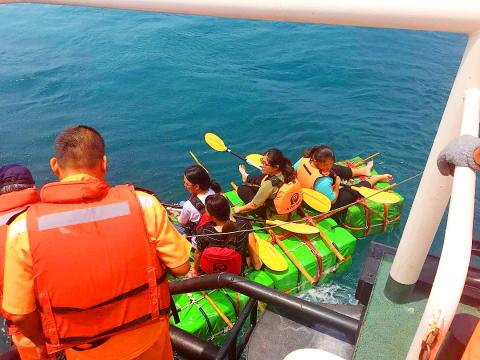Penghu-based Coast Guard Administration personnel and fishers yesterday morning rescued three rafts crewed by volunteer cadets trapped at sea by rough waves during a training excursion.
Fifty-seven cadets of the Tainan-based Chong Li Foundation were rowing improvised foam rafts during a team-building exercise, when they were caught by high waves caused by Typhoon Maria, the coast guards’ local patrol area office said in a statement.
Organizers called for help at 10:52am after three of the rafts went adrift at Baimaci Bay (白馬崎) off Siyu Islet (西嶼), it said.

Photo courtesy of the Coast Guard Administration’s Penghu flotilla
The coast guard patrol boat PP-10066 arrived at the scene seven minutes later, rescued five people from one boat at 11:05am and towed another raft to safety, while a private fishing vessel towed the third raft, it said.
Rowers on three other rafts were able to return to land on their own, it added.
The foundation and Chonghui Buddhist Seminary planned the event, while Neian Elementary School furnished classrooms for some of the activities, sources said.
The participants were foundation volunteer workers who were recruited from high schools and colleges in Tainan and Chiayi County, the sources said, adding that they are training over the summer.
The excursion’s leader, a man surnamed Pan (潘), said that the organizers knew about the typhoon and had moved the exercise to an earlier hour to avoid it.
However, the currents and winds proved too strong and carried several rafts far from their planned routes, Pan said, adding that the event’s escort boat was not fast enough to tow all of the rafts to safety.
No official order forbidding sailing had been issued at the time of the exercise, he added.

An essay competition jointly organized by a local writing society and a publisher affiliated with the Chinese Communist Party (CCP) might have contravened the Act Governing Relations Between the People of the Taiwan Area and the Mainland Area (臺灣地區與大陸地區人民關係條例), the Mainland Affairs Council (MAC) said on Thursday. “In this case, the partner organization is clearly an agency under the CCP’s Fujian Provincial Committee,” MAC Deputy Minister and spokesperson Liang Wen-chieh (梁文傑) said at a news briefing in Taipei. “It also involves bringing Taiwanese students to China with all-expenses-paid arrangements to attend award ceremonies and camps,” Liang said. Those two “characteristics” are typically sufficient

A magnitude 5.9 earthquake that struck about 33km off the coast of Hualien City was the "main shock" in a series of quakes in the area, with aftershocks expected over the next three days, the Central Weather Administration (CWA) said yesterday. Prior to the magnitude 5.9 quake shaking most of Taiwan at 6:53pm yesterday, six other earthquakes stronger than a magnitude of 4, starting with a magnitude 5.5 quake at 6:09pm, occurred in the area. CWA Seismological Center Director Wu Chien-fu (吳健富) confirmed that the quakes were all part of the same series and that the magnitude 5.5 temblor was

The brilliant blue waters, thick foliage and bucolic atmosphere on this seemingly idyllic archipelago deep in the Pacific Ocean belie the key role it now plays in a titanic geopolitical struggle. Palau is again on the front line as China, and the US and its allies prepare their forces in an intensifying contest for control over the Asia-Pacific region. The democratic nation of just 17,000 people hosts US-controlled airstrips and soon-to-be-completed radar installations that the US military describes as “critical” to monitoring vast swathes of water and airspace. It is also a key piece of the second island chain, a string of

The Central Weather Administration has issued a heat alert for southeastern Taiwan, warning of temperatures as high as 36°C today, while alerting some coastal areas of strong winds later in the day. Kaohsiung’s Neimen District (內門) and Pingtung County’s Neipu Township (內埔) are under an orange heat alert, which warns of temperatures as high as 36°C for three consecutive days, the CWA said, citing southwest winds. The heat would also extend to Tainan’s Nansi (楠西) and Yujing (玉井) districts, as well as Pingtung’s Gaoshu (高樹), Yanpu (鹽埔) and Majia (瑪家) townships, it said, forecasting highs of up to 36°C in those areas